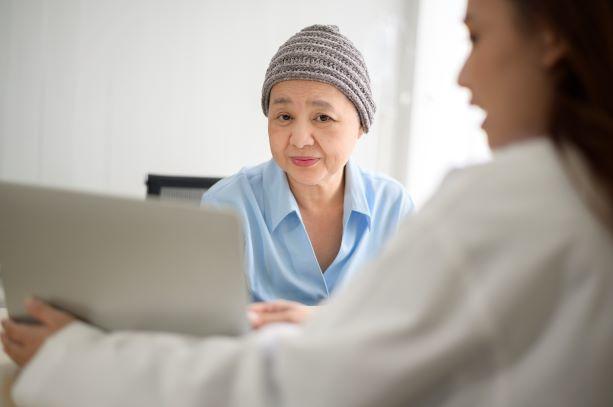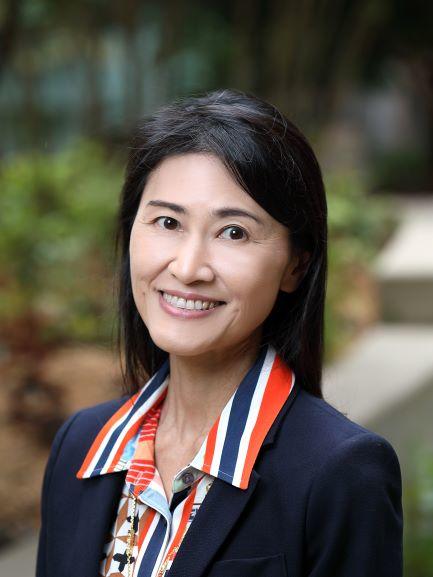Changing the Perception of Early-Phase Cancer Clinical Trials: A Conversation with Dr. Naoko Takebe
, by Sharon Reynolds
Clinical trials are an indispensable step in moving new cancer treatments from laboratory discoveries into everyday patient care. The initial human studies of new cancer treatments are called phase 1 clinical trials, and their primary goal is to find a safe dose for further testing. But a recent analysis shows that, despite their focus on safety, phase 1 trials of new cancer treatments may benefit participants more than previously thought.
In the analysis, Naoko Takebe, M.D., Ph.D., of NCI’s Cancer Therapy Evaluation Program (CTEP), and her NCI colleagues surveyed the last two decades of phase 1 clinical trials for solid tumors sponsored by CTEP. Over that period, they found, the number of trial participants whose tumors shrank or disappeared nearly doubled and the percentage of patients whose tumors stopped growing for a time also increased. The risk of death caused by a new treatment being tested, however, remained steady and very low, at less than 1%.
In this interview, Dr. Takebe talks about the findings and how they may alter the perception of these important early-phase trials.
Do you feel like there are misconceptions about phase 1 clinical trials?
Yes, the perception of the potential benefit to patients hasn’t caught up with modern drug development. In the past, participants in phase 1 trials generally have had low tumor response rates, about 4%–5%. In addition, the primary purpose of phase 1 trials is to assess safety. So, some doctors have not been enthusiastic about referring patients to phase 1 trials.
People also have to go through the standard treatment options first, and usually only those patients who run out of those options, or are not able to receive those standard options for some reason, are eligible to participate in a phase 1 trial. So there have been concerns about including people with advanced cancer, who may be very ill, in early clinical trials.
But we and others have now shown that things have changed. Participating in phase 1 trials has more potential for clinical benefit than is commonly believed, largely due to the development of modern cancer drugs, like targeted therapies, immunotherapies, and new combination therapies.
So I hope this analysis will have a positive impact on the enrollment of patients into phase 1 trials by doctors, who may feel more comfortable referring patients.
You found a few groups of people who had a slightly higher risk of treatment-related death in phase 1 trials compared with participants overall, including those who were older and sicker, and who had liver problems. Should these people not participate in clinical research?
No, they can definitely still participate, as long as they meet all the criteria for participation in a trial, and their doctor agrees it’s safe. And we have to overcome the misperception that they can’t.
In addition to the newer types of drugs being developed, we’ve also had advancements in supportive care. In all clinical trials, we're now much more proactive in supporting patients, including providing pain control and palliative care services, and watching for and appropriately managing side effects.
So factors like age should not necessarily stop patients from participating in a phase 1 clinical trial. But they should serve as an alert for the clinical trial team to be aware, to make sure patients understand the risks, and to monitor older, sicker patients more closely.
What other factors should patients and their doctors consider when weighing participation in a phase 1 clinical trial?
Participation in phase 1 trials does pose both a time and logistical burden, because there are frequent safety assessments on top of other aspects of treatment. Some patients may want more time at home with their families, rather than going back and forth between appointments.
But in order for patients to make an informed decision, we believe those with no further standard treatment options for their cancer should be informed about the option of participating in phase 1 trials.
“First-in-human” studies that test new drugs are just one type of phase 1 trial. Can you explain what other types of phase 1 trials are available, if people feel uncomfortable about the idea of participating in a first-in-human study?
Trials testing the safety and tolerability of a new drug for the first time in people are mostly sponsored by pharmaceutical companies. NCI sponsors some first-in-human phase 1 trials, but they’re not that common.
NCI tends to sponsor phase 1 trials investigating new combinations of drugs. Even if the drugs being used together have been tested individually in people, they are also required to be tested together in a phase 1 trial to determine the optimal dose of each agent that can be given safely in combination.
About 70% of the clinical trials that we analyzed in this study were drug combination trials.
How will greater participation in phase 1 trials benefit cancer medicine in general?
Enrollment in phase 1 trials has tended to be very slow. If we can enroll more patients more quickly, we can do additional phase 1 studies and ultimately bring more new drugs to patients faster.
But for more referrals, we hope oncologists will view these recent findings as paradigm shifting, and to have discussions with their patients about the potential benefit of participating in a phase 1 clinical trial, alongside the opportunity to advance cancer research.
The patients ultimately decide whether they should participate, but we, the oncologists, have to give them that option.

